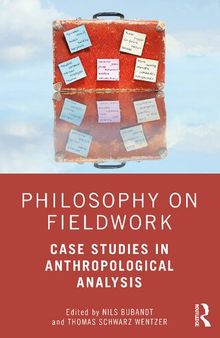 جزییات کتاب
جزییات کتاب
How do we teach analysis in anthropology and other field-based sciences? How can we engage analytically and interrogatively with philosophical ideas and concepts in our fieldwork? And how can students learn to engage critical ideas from philosophy to better understand the worlds they study? Philosophy on Fieldwork provides "show-don’t-tell" answers to these questions. In twenty-six "master class" chapters, philosophy meets anthropological critique as leading anthropologists introduce the thinking of one foundational philosopher – from a variety of Western traditions and beyond – and apply this critically to an ethnographic case. Nils Bubandt, Thomas Schwarz Wentzer and the contributors to this volume reveal how the encounter between philosophy and fieldwork is fertile ground for analytical insight to emerge. Equally, the philosophical concepts employed are critically explored for their potential to be thought "otherwise" through their frictional encounter with the worlds in the field, allowing non-Western and non-elite life experience and ontologies to "speak back" to both anthropology and philosophy. This is a unique and concrete guidebook to social analysis. It answers the critical need for a "how-to" textbook in fieldwork-based analysis as each chapter demonstrates how the ideas of a specific philosopher can be interrogatively applied to a concrete analytical case study. The straightforward pedagogy of Philosophy on Fieldwork makes this an accessible volume and a must-read for both students and seasoned fieldworkers interested in exploring the contentious middle ground between philosophy and anthropology.



 دانلود کتاب
دانلود کتاب

 جزییات کتاب
جزییات کتاب

 این کتاب رو مطالعه کردید؟ نظر شما چیست؟
این کتاب رو مطالعه کردید؟ نظر شما چیست؟
